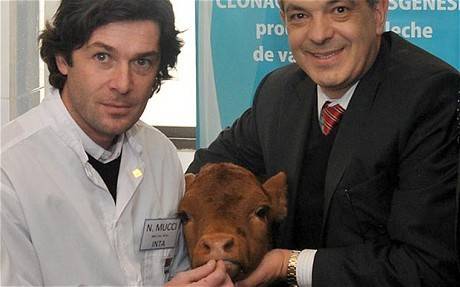阿根廷国家农业综合科技研究所的科学家们日前宣布,他们已成功培育出一头能够产人奶的奶牛,这在全世界范围内尚属首例。据科学家介绍,这头奶牛名叫罗西塔,出生前就已在体内植入了两种人类母乳的基因,这两种基因都是人类在哺乳期乳腺才能分泌的蛋白质,这样它产出的奶中所含的蛋白质就会与人奶中的相同。科学家表示,培育这种转基因奶牛是为了提高牛奶的营养价值,人奶中的蛋白质可为新生儿提供抗菌与抗病毒的保护,这种牛奶也能做到。

 |
|
Argentinian Agriculture Minister Julian Dominguez (R) posing with an unidentified scientist and 'Rosita Isa' the first Argentinian cloned calf in Balcarce |
Scientists in Argentina have created the world’s first cow to boast two human genes that will enable it to produce human-like milk.
Genetic engineering was used to introduce the “mothers’ milk” genes into the animal before birth, according to the National Institute of Agribusiness Technology in Buenos Aires.
As an adult the cloned cow “will produce milk that is similar to humans” in what will prove “a development of great importance for the nutrition of infants”, it said in a statement.
“The cloned cow, named Rosita ISA, is the first bovine born in the world that incorporates two human genes that contain the proteins present in human milk,” the statement said.
In April scientists in China published details of research showing that they had created GM Holstein dairy cows which produced milk containing proteins found in human breast milk.
But the Argentine team say the Chinese only introduced one human gene, whereas their research involved two genes meaning the milk will more closely resemble that of humans.
Rosita ISA was born on April 6 and was delivered by Caesarean section because she weighed around 100lbs, roughly twice the normal weight of Jersey cows.
Adrian Mutto, from the National University of San Martin which worked with the institute, said the human genes introduced were “both proteins that can be expressed only in the mammary gland during lactation.”
“Our goal was to raise the nutritional value of cows’ milk by adding two human genes, the protein lactoferrin, which provides infants with anti-bacterial and anti-viral protection, and lysozyme, which is also an anti-bacterial agent,” he added.
Cristina Kirchner, President of Argentina, said that the scientific institute “makes all Argentines proud.”
She also revealed that she had rejected the “honour” of having the cow named after her.
“They came to tell me that the name is Cristina, but what woman would like to have a cow named after her? It appeared to me to be more appropriate to call it Rosita.”
相关阅读
(Agencies)

(中国日报网英语点津 Helen )